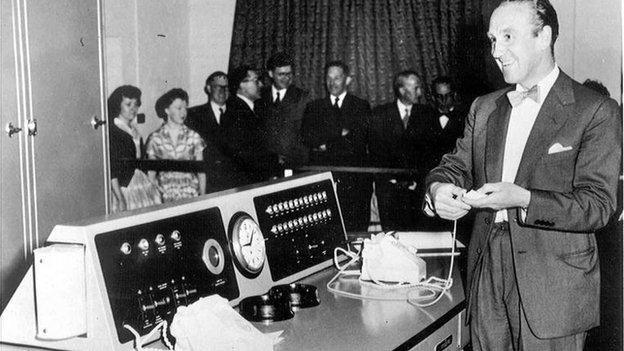Are Premium Bonds a good bet?
- Published

In 1957, Ernie used thermal noise to choose the numbers
There is good news for lovers of Premium Bonds.
From Sunday, the maximum sum any one person can invest rises to £40,000.
That is an increase of £10,000 from the current limit of £30,000. The last time the limit was raised was in May 2003, when it increased from £20,000 to £30,000.
It is the latest tweak to the operations of what was originally a scheme to help the government raise essential cash without going to the money markets.
For nearly 60 years now, Ernie - the UK's official electronic random-number-indicator - has been whirring away picking the month's prize-winning Premium Bonds.
Digital draw
About a third of us - that is 21 million people - already hold at least 100 of these National Savings and Investments (NS&I) lottery-style bonds.
"People tend to either love or hate Premium Bonds," says Sarah Pennells, editor of the Savvywoman website.
"Those who win regularly love them, but those who've never won a penny probably feel they're a waste of time."
Ernie has been steadily getting higher tech. Once upon a time, a letter postmarked "Lytham St Annes" told you if you had won a prize. Now you just check your numbers online.
But the basics remain the same. By investing in Premium Bonds, you forgo any interest payments on your money but are entered into a monthly prize draw in the hope of winning £1m.
Julian Hynd, NS&I's retail director, is clearly braced for a busy few days.
"Premium Bonds are one of the nation's favourite ways to save," he says.
"Raising the maximum amount that can be invested is good news for customers because the more they invest, the greater their chance of winning a tax-free prize."
That is certainly true, but it is also a fact that the odds on a good win are still not that great. So the big question for British savers is this: Assuming you have the cash, should you buy even more Premium Bonds simply because you can?
Tax-free
One way to assess the value of Premium Bonds is to study the "prize rate". That is the percentage of the whole fund paid out in prizes.
Over the years, the chances of winning on Ernie have been regularly tweaked to regulate the flow of deposits and match market conditions. The bad news is that the prize rate was recently cut from 1.5% to 1.3%. That means for each £100-worth of premium bonds that you hold, your average annual return will be £1.30.
That is not enough for a cup of coffee on the High Street. However, some easy access savings accounts offer a similar or even worse rate of return, so it is not surprising that many people like the idea of at least keeping their principal sum safe, and enjoying a harmless flutter with a chance of bagging a tax-free windfall.

Ernie has become much more hi-tech than in the early days
Of course, you could be unlucky and win nothing at all. That's Ernie for you.
Christine Ross, head of wealth planning at SG Hambros Bank, says some people treat Premium Bonds as a useful form of tax-free allowance. Others see them as a cheaper way of playing a lottery.
Ms Ross says some hold them for nostalgic reasons, because they have always had a few hundred tucked away.
"A lot hangs on whether you rely on absolutely every bit of income from your investments," she says.
"If you have got the money and probably if you are a higher rate taxpayer, then yes, Premium Bonds are a good idea. In that case it is worth maxing up to take advantage of this increase in the maximum number of bonds that you can hold."
But Ms Pennells is less keen, warning that it is not a good idea to pile extra money into Premium Bonds in the hope that your luck will change.
"Think about what you want your money to do before you put it in Premium Bonds," she says.
"The equivalent interest rate is 1.3%, but the payout is tax-free so it works out more if you pay tax. But that doesn't mean you'll get 1.3% of your stake in prizes. That's the amount you could get if you have 'average' luck, whatever that is!
"I'd say that if you need to have a regular and dependable payout, I wouldn't invest in Premium Bonds. But if you want a safe home for your money, National Savings & Investments' accounts are backed by the government, and if you don't mind if you don't make any money, then go ahead."
Premium Bond myths
Another change announced in Chancellor George Osborne's Budget comes into force from the August draw. From that month, there are to be two £1m prizes instead of one. But there is a catch - there will be fewer smaller prizes.
No one doubts Ernie will remain as busy as ever. In May 2014, he paid out over 1.8 million prizes, ranging from £25 to the £1m jackpot. The overall payout is dictated by the current prize rate and the number of bonds in each monthly draw.
NS&I is also keen to dispel several myths that have grown up around Ernie. One is that older numbers never win. They have an equal chance, it is just that there are so many more of the newer (and longer) numbers.
Another myth is that people in the South East of England win more often. The answer to that is simply that more bonds are bought there compared to the rest of the UK.
But, in the end, for most people a Premium Bond represents a dream rather than much understanding of the complex world of probability, which is just as well because, if you put your savings in a cash Isa and buy a lottery ticket every month, you have slightly better odds of becoming a millionaire.
The material is for general information only and does not constitute investment, tax, legal or other form of advice. You should not rely on this information to make (or refrain from making) any decisions. Links to external sites are for information only and do not constitute endorsement. Always obtain independent professional advice for your own particular situation.